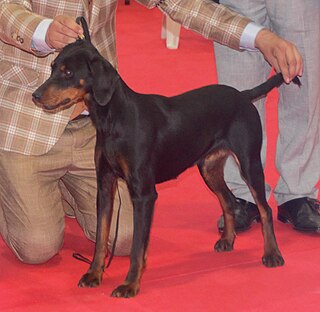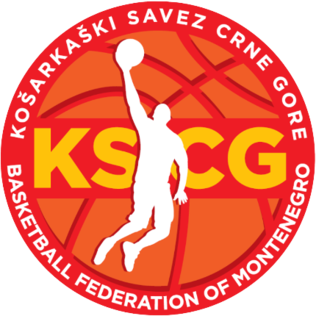
Montenegro is a country in Southeastern Europe. It is a part of the Balkans and is bordered by Bosnia and Herzegovina to the north, Serbia to the northeast, Kosovo to the east, Albania to the southeast, Croatia to the northwest, and the Adriatic Sea to the west with a coastline of 293.5 km. Podgorica, the capital and largest city, covers 10.4% of Montenegro's territory of 13,812 square kilometres (5,333 sq mi), and is home to roughly 31% of its total population of 621,000. Cetinje is the former royal capital of Montenegro and is the location of several national institutions, including the official residence of the president of Montenegro.
The early written records of the history of Montenegro begin with Illyria and its various kingdoms until the Roman Republic incorporated the region into the province of Illyricum after the Illyro-Roman Wars.

The Montenegrin Mountain Hound is a rare dog breed from the mountain regions across the Balkans. Black and tan, with a smooth coat, the Montenegrin Mountain Hound was called Black Hound in the past. The breed is of the same origin as the other Balkan hounds. It stands 18 to 22 inches high and weighs 44 to 55 pounds. The breed is used to hunt fox, hare, and small game, occasionally hunting larger animals such as deer or even wild boar.

Montenegrins are a South Slavic ethnic group that share a common Montenegrin culture, history, and language, identified with the country of Montenegro.
Montenegrin is a normative variety of the Serbo-Croatian language mainly used by Montenegrins and is the official language of Montenegro. Montenegrin is based on the most widespread dialect of Serbo-Croatian, Shtokavian, more specifically on Eastern Herzegovinian, which is also the basis of Standard Croatian, Serbian, and Bosnian.

The Kingdom of Montenegro was a monarchy in southeastern Europe, present-day Montenegro, during the tumultuous period of time on the Balkan Peninsula leading up to and during World War I. Officially it was a constitutional monarchy, but absolutist in practice. On 28 November 1918, following the end of World War I, with the Montenegrin government still in exile, the Podgorica Assembly proclaimed unification with the Kingdom of Serbia, which itself was merged into the Kingdom of Serbs, Croats and Slovenes three days later, on 1 December 1918. This unification with Serbia lasted, through various successor states, for almost 88 years, ending in 2006.

The Armed Forces of Montenegro are the military forces of Montenegro. The Armed Forces consists of an army, navy and air force.
The culture of Montenegro is as pluralistic and diverse as its history and geographical position would suggest. Montenegro's culture has been influenced by the Serbian Empire, the Byzantine Empire, Ancient Greece, Ancient Rome, Christianity, the Ottoman Empire, the Republic of Venice, Austria-Hungary, and Yugoslavia.

The Football Association of Montenegro is the governing body of football in Montenegro. It is based in the capital, Podgorica.
Sport in Montenegro revolves mostly around team sports, such as football, basketball, handball, and volleyball. Other sports involved are boxing, tennis, swimming, judo, karate, athletics, table tennis, and chess.

OFK Titograd is a professional football club based in Podgorica, Montenegro. Founded in 1951, they play in the Third League of Montenegro. The team has one league trophy and two Montenegrin Cup trophies. OFK Titograd is a member of the European Club Association.
Montenegrin Americans are Americans who are of Montenegrin origin. The figure includes all people affiliated with United States who claim Montenegrin ancestry, both those born in the country and naturalized citizens, as well as those with dual citizenship who affiliate themselves with both countries or cultures. The number of Montenegrin Americans in the United States is unknown, as the Montenegrin community has not been differentiated in the United States Censuses as different from closely related Yugoslav American groups; therefore Montenegrin Americans are likely to identify with those groups.

The Prva A liga, for sponsorships reasons named the Erste Liga, is the top-tier professional basketball league in Montenegro. It is the highest basketball division organized by the Basketball Association of Montenegro (KSCG). It was established in 2006. shortly after Montenegro declared its independence from Serbia and Montenegro.
The Battle of Fundina took place on 2 August 1876 in Fundina, a village in Kuči, Principality of Montenegro. The day had a religious importance, as being the St. Elijah's Day. The Montenegrin Army was led by the two Montenegrin dukes, Ilija Plamenac and Marko Miljanov, who had about 5,000 troop under their direct command. Ottomans had strength of 40,000. Days before the battle, a Montenegrin Muslim, Mašo-Hadži Ahmetov revealed Ottoman plans to Marko Miljanov, so that Montenegrins knew where the attack was going to come from.
The Montenegrin alphabet is the collective name given to "Abeceda" and "Азбука", the writing systems used to write the Montenegrin language. It was adopted on 9 June 2009 by the Montenegrin Minister of Education, Sreten Škuletić and replaced the Serbian Cyrillic and Gaj's Latin alphabets in use at the time.
The Montenegrin Basketball Cup is an annual cup competition for Montenegrin basketball teams held since 2007.

Montenegrin nationalism is the nationalism that asserts that Montenegrins are a nation and promotes the cultural unity of Montenegrins.

Serbs of Montenegro or Montenegrin Serbs, compose native and the second largest ethnic group in Montenegro, after the ethnic Montenegrins. Additional 0.64% of the population is made up of Serbs-Montenegrins and Montenegrins-Serbs.
After the end of every competitive season, football clubs from Montenegro play in European competitions.
Teams from Montenegro have been playing on the international scene since they represented SFR Yugoslavia during the 1970s. Since 2006, Montenegrin teams have played as representatives of independent Montenegro, and qualified through the Montenegrin First League and Montenegrin Cup.
Currently, four Montenegrin clubs take part in UEFA European Cups. The champion of the First Montenegrin League plays in UEFA Champions League qualifiers. The second and third placed team from the First League play in UEFA Europa Conference League qualifiers. The winner of the Montenegrin Cup also plays in the Europa Conference league.
Anti-Montenegrin sentiment is a generally negative view of Montenegrins as an ethnic group, commonly involving denial of the Montenegrin ethnicity and language, and negative feelings towards Montenegro. It is present in right-wing discourse in Montenegro and the ex-Yugoslavia region, mainly Serbia, and dates back to the 19th and 20th century.








